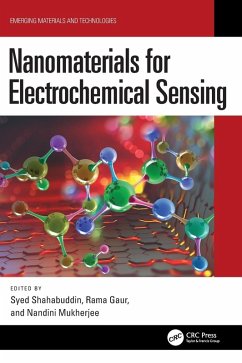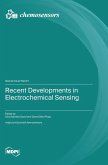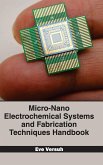Nanomaterials for Electrochemical Sensing
Herausgeber: Shahabuddin, Syed; Mukherjee, Nandini; Gaur, Rama
Nanomaterials for Electrochemical Sensing
Herausgeber: Shahabuddin, Syed; Mukherjee, Nandini; Gaur, Rama
- Gebundenes Buch
- Merkliste
- Auf die Merkliste
- Bewerten Bewerten
- Teilen
- Produkt teilen
- Produkterinnerung
- Produkterinnerung
This book overviews fundamentals of electrochemical sensors, the preparation of electrodes, potential materials for sensing applications, different analytical methods used for electrochemical sensing applications. It further covers designing of various electrodes and electrode materials, advanced nanomaterials for sensing and so forth.
Andere Kunden interessierten sich auch für
![Recent Developments in Electrochemical Sensing Recent Developments in Electrochemical Sensing]() Recent Developments in Electrochemical Sensing72,99 €
Recent Developments in Electrochemical Sensing72,99 €![Advanced Nanomaterials for Electrochemical Energy Conversion and Storage Advanced Nanomaterials for Electrochemical Energy Conversion and Storage]() Advanced Nanomaterials for Electrochemical Energy Conversion and Storage71,99 €
Advanced Nanomaterials for Electrochemical Energy Conversion and Storage71,99 €![Nanomaterials and Nanofabrication for Electrochemical Energy Storage Nanomaterials and Nanofabrication for Electrochemical Energy Storage]() Nanomaterials and Nanofabrication for Electrochemical Energy Storage45,99 €
Nanomaterials and Nanofabrication for Electrochemical Energy Storage45,99 €![Materials for Electrochemical Energy Storage and Conversion II Batteries, Capacitors and Fuel Cells Materials for Electrochemical Energy Storage and Conversion II Batteries, Capacitors and Fuel Cells]() Materials for Electrochemical Energy Storage and Conversion II Batteries, Capacitors and Fuel Cells38,99 €
Materials for Electrochemical Energy Storage and Conversion II Batteries, Capacitors and Fuel Cells38,99 €![Advanced Two-Dimensional Nanomaterials for Environmental and Sensing Applications Advanced Two-Dimensional Nanomaterials for Environmental and Sensing Applications]() Advanced Two-Dimensional Nanomaterials for Environmental and Sensing Applications205,99 €
Advanced Two-Dimensional Nanomaterials for Environmental and Sensing Applications205,99 €![Environmental and Technological Aspects of Redox Processes Environmental and Technological Aspects of Redox Processes]() Environmental and Technological Aspects of Redox Processes203,99 €
Environmental and Technological Aspects of Redox Processes203,99 €![Micro-Nano Electrochemical Systems and Fabrication Techniques Handbook Micro-Nano Electrochemical Systems and Fabrication Techniques Handbook]() Micro-Nano Electrochemical Systems and Fabrication Techniques Handbook106,99 €
Micro-Nano Electrochemical Systems and Fabrication Techniques Handbook106,99 €-
-
-
This book overviews fundamentals of electrochemical sensors, the preparation of electrodes, potential materials for sensing applications, different analytical methods used for electrochemical sensing applications. It further covers designing of various electrodes and electrode materials, advanced nanomaterials for sensing and so forth.
Produktdetails
- Produktdetails
- Verlag: CRC Press
- Seitenzahl: 376
- Erscheinungstermin: 8. Mai 2025
- Englisch
- Abmessung: 260mm x 183mm x 25mm
- Gewicht: 901g
- ISBN-13: 9781032458885
- ISBN-10: 1032458887
- Artikelnr.: 72211607
- Herstellerkennzeichnung
- Libri GmbH
- Europaallee 1
- 36244 Bad Hersfeld
- gpsr@libri.de
- Verlag: CRC Press
- Seitenzahl: 376
- Erscheinungstermin: 8. Mai 2025
- Englisch
- Abmessung: 260mm x 183mm x 25mm
- Gewicht: 901g
- ISBN-13: 9781032458885
- ISBN-10: 1032458887
- Artikelnr.: 72211607
- Herstellerkennzeichnung
- Libri GmbH
- Europaallee 1
- 36244 Bad Hersfeld
- gpsr@libri.de
Syed Shahabuddin did his Ph.D. degree in Polymer Chemistry from University of Malaya, Malaysia, in September 2016. Currently, he is working as an assistant professor in Pandit Deendayal Petroleum University, Gandhinagar, and Gujrat. He has published more than 70 research articles in International journals of repute and presented 10 papers in International/National conferences. He is the member of Royal Society of Chemistry (MRSC) and reviewer of many high impact journals. His current research focus on the synthesis of Nanomaterials, 2D-MXene, Graphene, conducting polymer nanocomposites for water treatment, photocatalysis, supercapacitors, DSSCs, nanofluids for solar thermal applications, waste lubricant oil refining and phase change materials. Rama Gaur is working as an Assistant Professor, School of Technology, PDPU Gandhinagar, Gujarat. She received her Ph.D. degree in Chemistry from IIT Roorkee in 2017. Dr. Gaur has expertise in synthesis of nanoscale materials with interesting and unique morphologies by simple and economical chemical approaches; Shape and size dependent optical, magnetic and electrochemical properties; Applications in photocatalysis, optoelectronics, electrochemical sensing, electrocatalytic reduction/oxidation, solar energy conversion, energy storage devices, supercapacitors, water splitting and environmental remediation. Nandini Mukherjee received her Ph.D. degree in Bioinorganic and Medicinal Chemistry from Indian Institute of Science, Bangalore in 2020. Currently, she is working as an Assistant Professor in the Department of Chemistry, Pandit Deendayal Energy University (PDEU), Gandhinagar, and Gujarat. Prior to joining PDEU she has also worked as a research associate in IISc Bangalore. She has more than 5 years of research experience in organic synthesis and coordination chemistry and published her research in international peer-reviewed journals. Her current research interest focuses on the design and synthesis of molecules that have applications in the field of chemo-sensing of toxins and monitoring biological phenomena.
1.Introduction to Electrochemical Sensors 2. Contemporary Techniques of Fabrication of Electrochemical Sensors 3. Analytical Methods for Electrochemical Sensors 4. Carbon-Based Materials for Electrochemical Sensing 5. Metal Oxide Nanomaterials Based Materials For Electrochemical Sensing 6. Metal Nanoparticles for Electrochemical Sensing 7. Two-dimensional Materials for Electrochemical Sensing 8. Recent Advancement in Electrochemical Biosensors: The Role of Conducting Polymer Nanohybrid Materials 9. Emerging Materials for Gas Sensing 10. Mycotoxins as Food Contaminants and Their Detection Methods 11.Reviewing the Prospects of Machine Learning for High
Performance Electrochemical Sensors 12. Nanomaterials for Electrochemical Sensing of Explosive Substances 13. Fabrication of MOF
Based Electrochemical Sensor 14. Porphyrin
Functionalized Hybrid Materials for Biosensing Applications 15. Graphene
Based Metamaterial Absorbers for Electrochemical Sensing 16. Electrochemical Biosensors Based on Nanomaterial Functionality 17. Influence of Diffusion, Convection, and Reaction Time Scales on Cyclic Voltammetry Targeting Efficient Electrochemical Sensor Design 18. Advances, Opportunities, and Challenges in Development of 2
D MXene
Based Aptasensors for Early Cancer Detection19. Process Design of Electrochemical Sensors 20. Challenges and Future Prospects in Electrochemical Sensing
Performance Electrochemical Sensors 12. Nanomaterials for Electrochemical Sensing of Explosive Substances 13. Fabrication of MOF
Based Electrochemical Sensor 14. Porphyrin
Functionalized Hybrid Materials for Biosensing Applications 15. Graphene
Based Metamaterial Absorbers for Electrochemical Sensing 16. Electrochemical Biosensors Based on Nanomaterial Functionality 17. Influence of Diffusion, Convection, and Reaction Time Scales on Cyclic Voltammetry Targeting Efficient Electrochemical Sensor Design 18. Advances, Opportunities, and Challenges in Development of 2
D MXene
Based Aptasensors for Early Cancer Detection19. Process Design of Electrochemical Sensors 20. Challenges and Future Prospects in Electrochemical Sensing
1.Introduction to Electrochemical Sensors 2. Contemporary Techniques of Fabrication of Electrochemical Sensors 3. Analytical Methods for Electrochemical Sensors 4. Carbon-Based Materials for Electrochemical Sensing 5. Metal Oxide Nanomaterials Based Materials For Electrochemical Sensing 6. Metal Nanoparticles for Electrochemical Sensing 7. Two-dimensional Materials for Electrochemical Sensing 8. Recent Advancement in Electrochemical Biosensors: The Role of Conducting Polymer Nanohybrid Materials 9. Emerging Materials for Gas Sensing 10. Mycotoxins as Food Contaminants and Their Detection Methods 11.Reviewing the Prospects of Machine Learning for High
Performance Electrochemical Sensors 12. Nanomaterials for Electrochemical Sensing of Explosive Substances 13. Fabrication of MOF
Based Electrochemical Sensor 14. Porphyrin
Functionalized Hybrid Materials for Biosensing Applications 15. Graphene
Based Metamaterial Absorbers for Electrochemical Sensing 16. Electrochemical Biosensors Based on Nanomaterial Functionality 17. Influence of Diffusion, Convection, and Reaction Time Scales on Cyclic Voltammetry Targeting Efficient Electrochemical Sensor Design 18. Advances, Opportunities, and Challenges in Development of 2
D MXene
Based Aptasensors for Early Cancer Detection19. Process Design of Electrochemical Sensors 20. Challenges and Future Prospects in Electrochemical Sensing
Performance Electrochemical Sensors 12. Nanomaterials for Electrochemical Sensing of Explosive Substances 13. Fabrication of MOF
Based Electrochemical Sensor 14. Porphyrin
Functionalized Hybrid Materials for Biosensing Applications 15. Graphene
Based Metamaterial Absorbers for Electrochemical Sensing 16. Electrochemical Biosensors Based on Nanomaterial Functionality 17. Influence of Diffusion, Convection, and Reaction Time Scales on Cyclic Voltammetry Targeting Efficient Electrochemical Sensor Design 18. Advances, Opportunities, and Challenges in Development of 2
D MXene
Based Aptasensors for Early Cancer Detection19. Process Design of Electrochemical Sensors 20. Challenges and Future Prospects in Electrochemical Sensing









